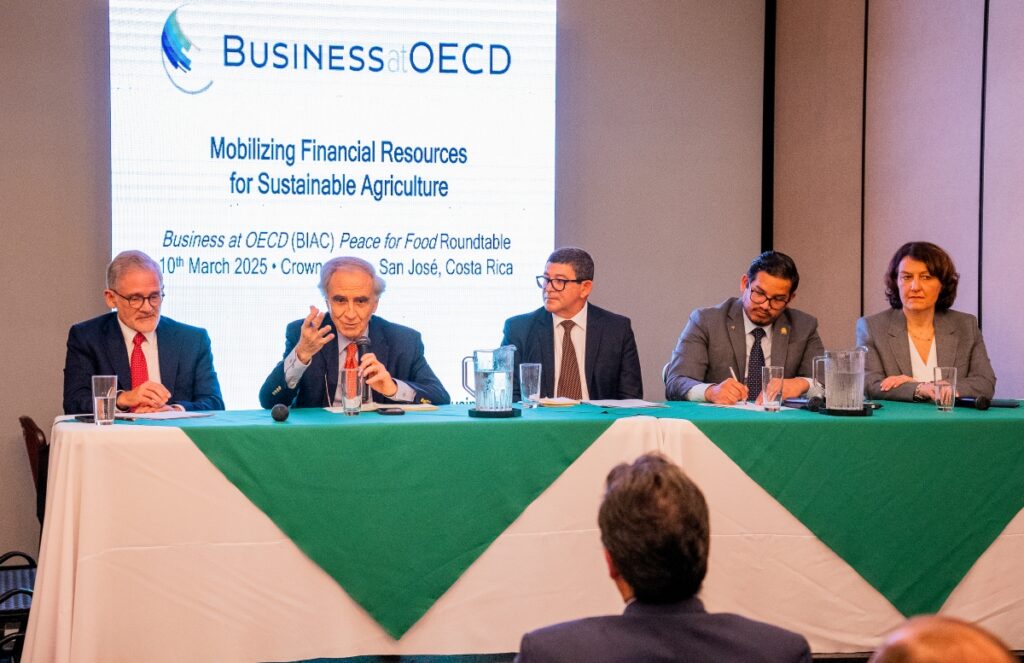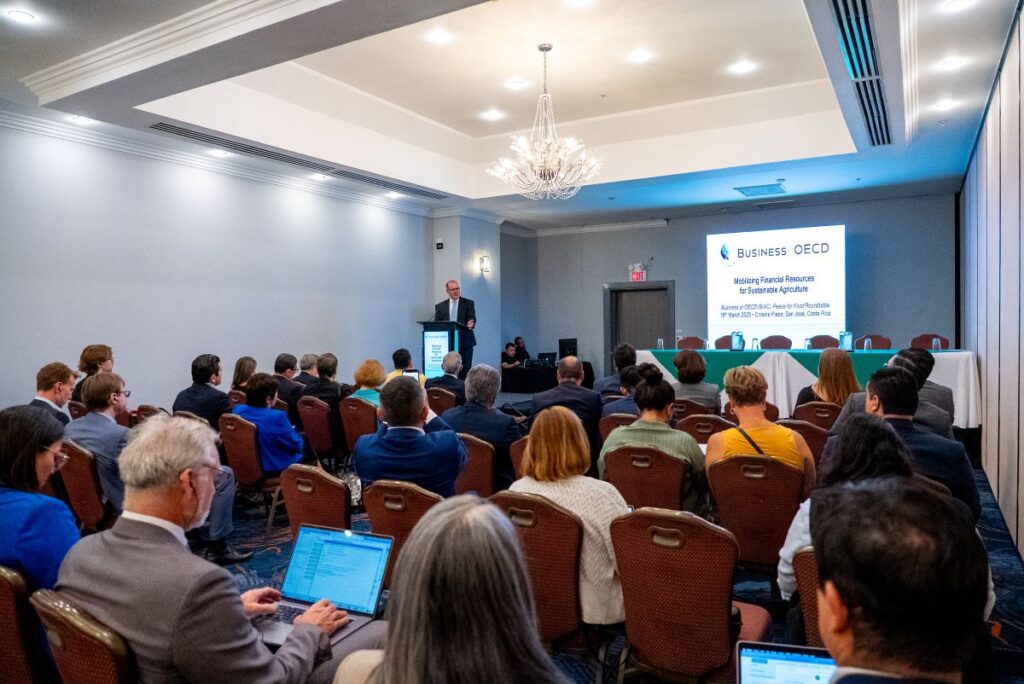
San José, 12 March 2025 (IICA). According to global experts and leaders taking part in a high-level roundtable, robust public policies and favorable science-based regulatory frameworks, appropriate financial instruments, technological and digital innovation, public-private partnerships, training, technical assistance, and market access are all crucial tools for boosting the mobilization of financial resources for sustainable agriculture in Latin America and the Caribbean.
The event, entitled “Mobilization of Financial Resources for Sustainable Agriculture”, was organized in San José, Costa Rica, by the BIAC (the Business and Industry Advisory Committee, now referred to simply as Business at OECD) of the Organization for Economic Co-operation and Development (OECD), Bayer, and the Inter-American Institute for Cooperation on Agriculture (IICA).
The participants included members of the BIAC (the institutional business arm of the OECD that represents 10 million companies worldwide), representatives of agribusiness, agricultural technical cooperation organizations, policymakers and financial institutions, among others, with the aim of identifying practical solutions to promote long-term investment in sustainable agriculture, ensuring more resilient and productive food systems around the world.
The opening remarks were delivered by Hanni Rosenbaum, Executive Director of Business at OECD; Lloyd Day, Deputy Director General of IICA; and Elías Soley, Costa Rica’s Ambassador and Permanent Representative to the OECD.
“We must ensure that farmers can access the financial resources they need to transition to more sustainable practices. Our ability to mobilize them effectively will determine how we build resilient food systems, empower rural communities, and foster long-term agricultural sustainability”, Rosenbaum said.
“Technological innovation is urgently needed, and digital agriculture will be key to providing the tools needed to make farming practices sustainable and more productive”, she remarked.
Soley pointed out the need for “science- and data-based public policies to advance towards sustainable agriculture. While public support for agriculture has increased, there is still enormous potential to increase investments that strengthen essential services such as research, technology and infrastructure. Mobilizing public and private investments is essential to drive agricultural transformation, foster climate resilience, and ensure inclusive economic growth”, he suggested.
“We regard financing as a key issue in guaranteeing farmers the resources they need to continue producing food and developing innovation, science and technology. Spaces for dialogue of this kind are essential to construct joint solutions that make the mobilization of financing for producers in our region a reality”, added IICA’s Deputy Director General.
Other participants in the high-level roundtable included Víctor Carvajal, Minister of Agriculture of Costa Rica; Marion Jansen, Director of Trade at the OECD; Eugenio Diaz-Bonilla, sustainability specialist and Special Advisor to IICA; José Perdomo, President and General Director of CropLife LATAM; and Luis Pocasangre, Director General of the Tropical Agricultural Research and Higher Education Center (CATIE).
Alejandra Castro, Vice President of International Affairs and Sustainability Strategy at Bayer AG, moderated the discussion.
Actions and challenges
“Today, Costa Rican farmers do not engage in deforestation and apply responsible environmental practices, we have high standards and sufficient data to demonstrate that our producers are part of the solution to having a better ecosystem”, pointed out Minister Carvajal, who also noted that this year’s work began with financial mechanisms for the scaling up of Nationally Appropriate Mitigation Actions (NAMAs) in the livestock, coffee and sugarcane industries, promoting climate change adaptation, and a credit program implemented by the development banking system that offers interest rates of four percent, to enable producers to apply sustainable technologies and transition towards more environmentally friendly practices.
Marion Jansen, Director of Trade at the OECD, stressed the need for public policies that introduce efficient technologies and encourage innovation. She also highlighted the importance of certifications to ensure access to global markets. “Knowledge is required, as are public policies that help farmers so countries can introduce technologies, research, and more efficient platforms for agriculture that are good for productivity and sustainability. We have the leadership to bring about change”, she argued.
Eugenio Diaz-Bonilla, sustainability specialist and Special Advisor to IICA, then highlighted the main financing flows for food and nutrition security in Latin America and the Caribbean: the financing of food production and consumption; public spending; international development flows; and financing from the banking system and capital markets. He also emphasized the need to redirect those resources toward sustainable technologies that address current environmental, nutritional and productive challenges.
José Perdomo, President and CEO of CropLife LATAM, highlighted the fact that the crop science industry invests more than eight billion dollars per year in research to develop agricultural technologies and inputs such as seeds, biochemicals and other products that increase agricultural productivity and guarantee food security; but also mentioned that it faces increasingly complex regulatory challenges that hinder innovation.
“The agrochemical industry is the most regulated in the world, even more so than the pharmaceutical industry. We need regulations that allow us to innovate, intellectual property protection that encourages companies to continue investing. We need to focus on sustainable agriculture, protect biodiversity, and bequeath a better world to our children, and we firmly believe that technology and innovation are part of the key. We have to find a way to channel it and finance it so that farmers have access to it”, he remarked.
CATIE Director General Luis Pocasangre emphasized that it is crucial that farmers themselves be at the heart of any process, since they are ultimately the ones responsible for implementing good sustainable practices, and that is where agricultural success lies.
“Innovation and technology, such as genetic improvement, are essential to address the challenges facing the sector, as is cooperation between governments, the private sector and research institutions to ensure financing and access to technologies. Mechanization and production models adapted to climate change are urgently needed to compensate for the insufficient supply of labor, and to reduce risks. In addition, strengthening cooperatives, training rural women, and supporting indigenous communities will guarantee sustainable and profitable agriculture”, he concluded.
The roundtable discussion is part of the Peace for Food campaign, launched by Business at OECD in 2022. It is a global platform dedicated to addressing food security challenges by promoting sustainable agricultural innovation and strengthening agrifood value chains.
The initiative is designed to bring international stakeholders together to enhance corporate contributions to the OECD’s work in agriculture, demonstrating a strong commitment to achieving global sustainability goals.
The event was also used to explore other issues such as the importance of mobilizing financial resources for the development of regenerative agriculture with key stakeholders and the OECD; identify concrete solutions and partnerships to support sustainable agriculture initiatives; improve collaboration between governments, the private sector and international organizations to promote the development of sustainable agriculture; and elevate the importance of agricultural issues in global discussions.












